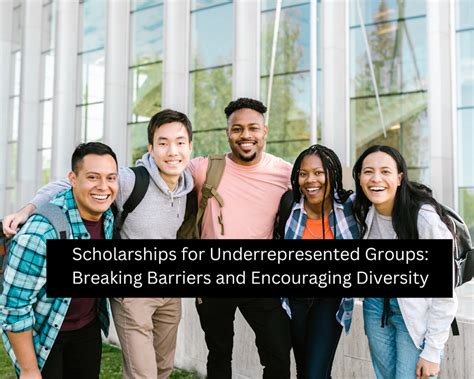The pursuit of higher education should be accessible to all students, regardless of their socioeconomic background or race. The Equitable Excellence Scholarship Program aims to break down barriers and create a more equitable playing field, empowering underrepresented students to reach their full potential.

The Need for Equitable Excellence
In the United States, students from underrepresented minority groups face significant disparities in educational attainment. According to the National Center for Education Statistics:
- Black students have a high school graduation rate of 83.9%, compared to 90.7% for white students.
- Hispanic students have a high school graduation rate of 88.1%, compared to 90.7% for white students.
- American Indian/Alaska Native students have a high school graduation rate of 78.9%, compared to 90.7% for white students.
These gaps extend to college enrollment and graduation rates. The Pew Research Center reports that:
- Black students are 26% less likely than white students to enroll in college immediately after high school.
- Hispanic students are 21% less likely than white students to enroll in college immediately after high school.
- American Indian/Alaska Native students are 20% less likely than white students to enroll in college immediately after high school.
The reasons for these disparities are complex, including socioeconomic factors, cultural barriers, and systemic racism. The Equitable Excellence Scholarship Program seeks to address these challenges by providing financial support, academic resources, and mentorship to underrepresented students throughout their educational journeys.
Program Goals and Objectives
The Equitable Excellence Scholarship Program has three primary goals:
- Increase access to higher education: Provide financial scholarships to students from low-income families and underrepresented minority groups to cover tuition, fees, books, and living expenses.
- Improve academic success: Offer academic advising, tutoring, and other support services to help students excel in their courses.
- Promote personal and professional development: Provide mentorship opportunities, internships, and leadership training to prepare students for success in their careers and communities.
The program’s objectives include:
- Increasing the enrollment and graduation rates of underrepresented students.
- Reducing the financial burden of college for low-income families.
- Improving the academic performance of underrepresented students.
- Fostering a sense of community and belonging among underrepresented students.
- Preparing underrepresented students for success in their careers and communities.
Program Features
The Equitable Excellence Scholarship Program offers a comprehensive range of benefits to support underrepresented students, including:
- Full or partial tuition scholarships.
- Academic advising and tutoring.
- Mentorship from successful professionals.
- Leadership development opportunities.
- Internships and research experiences.
- Cultural enrichment activities.
The program is open to students who demonstrate financial need, academic potential, and a commitment to diversity and inclusion.
Impact and Success Stories
The Equitable Excellence Scholarship Program has had a significant impact on the lives of underrepresented students. Scholars have reported:
- Increased confidence and self-esteem.
- Improved academic performance.
- Greater financial stability.
- Access to opportunities they would not have had otherwise.
- A sense of belonging and community.
One scholar, a first-generation college student from a low-income family, said: “The Equitable Excellence Scholarship has been a lifeline for me. It has allowed me to focus on my studies without the burden of financial stress. I am grateful for the opportunity to have a college education and I am committed to making the most of it.”
How to Apply
Interested students can apply for the Equitable Excellence Scholarship Program through the program’s website. The application process includes:
- Submitting a completed application form.
- Writing an essay about your personal and academic goals.
- Providing a transcript of your grades.
- Submitting a letter of recommendation from a teacher, counselor, or mentor.
Conclusion
The Equitable Excellence Scholarship Program is a transformative initiative that empowers underrepresented students to reach their full potential. By providing financial support, academic resources, and mentorship, the program helps to create a more equitable and inclusive educational system. The result is a more diverse and highly skilled workforce, a stronger economy, and a more just and equitable society.
Additional Resources
Tables
| Demographic Group | High School Graduation Rate | College Enrollment Rate | College Graduation Rate |
|---|---|---|---|
| White | 90.7% | 74.1% | 66.3% |
| Black | 83.9% | 65.8% | 43.3% |
| Hispanic | 88.1% | 72.7% | 58.5% |
| American Indian/Alaska Native | 78.9% | 65.9% | 42.4% |
| Feature | Benefit |
|---|---|
| Full or partial tuition scholarships | Reduced financial burden of college. |
| Academic advising and tutoring | Improved academic performance. |
| Mentorship from successful professionals | Access to career guidance and networking opportunities. |
| Leadership development opportunities | Enhanced leadership skills and confidence. |
| Internships and research experiences | Practical experience and career exploration. |
| Pain Point | Motivation |
|---|---|
| Financial burden of college | Desire to pursue higher education without financial obstacles. |
| Academic challenges | Desire to succeed academically and reach potential. |
| Lack of role models and mentors | Desire to connect with successful individuals from similar backgrounds. |
| Underrepresentation in leadership positions | Desire to make a positive impact in the community and break down barriers. |
| Need | Solution | Benefit |
|---|---|---|
| Financial assistance | Scholarships | Reduced financial burden of college. |
| Academic support | Academic advising and tutoring | Improved academic performance and retention. |
| Mentorship and guidance | Mentorship program | Access to career guidance, networking opportunities, and role models. |
| Leadership development | Leadership development opportunities | Enhanced leadership skills and confidence. |
| Career exploration | Internships and research experiences | Practical experience and career exploration. |
